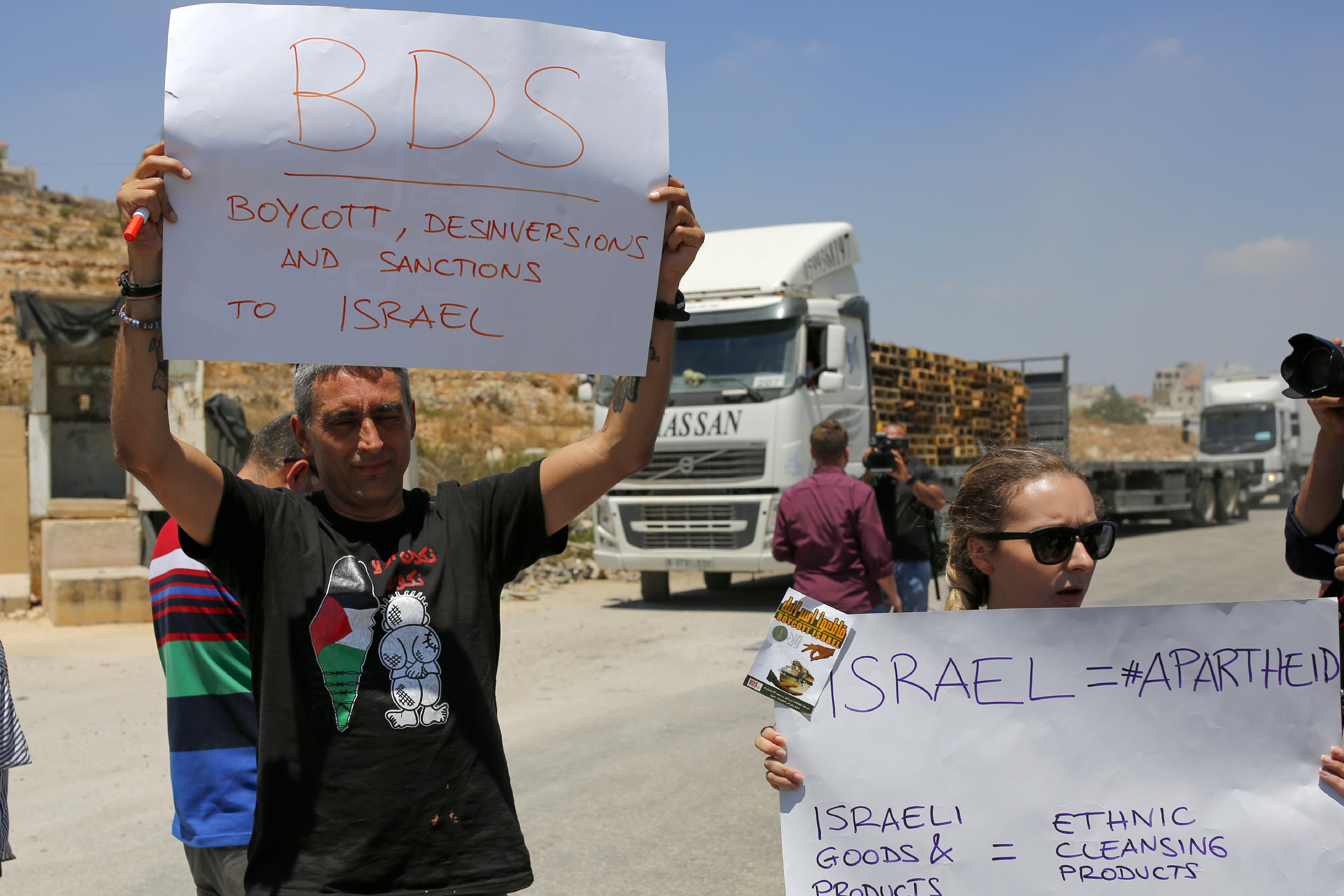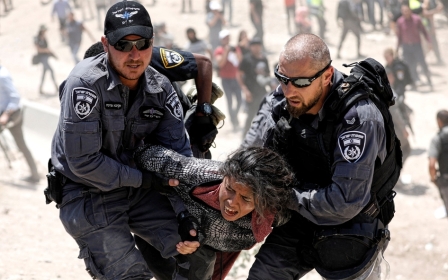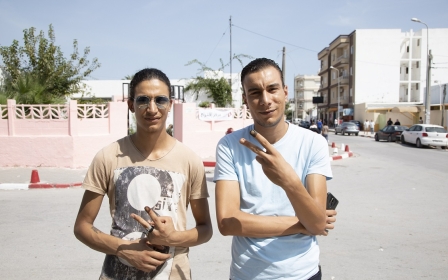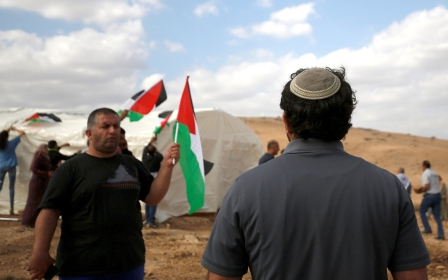A letter to Tunisia's new president: Keep fighting for Palestinian rights
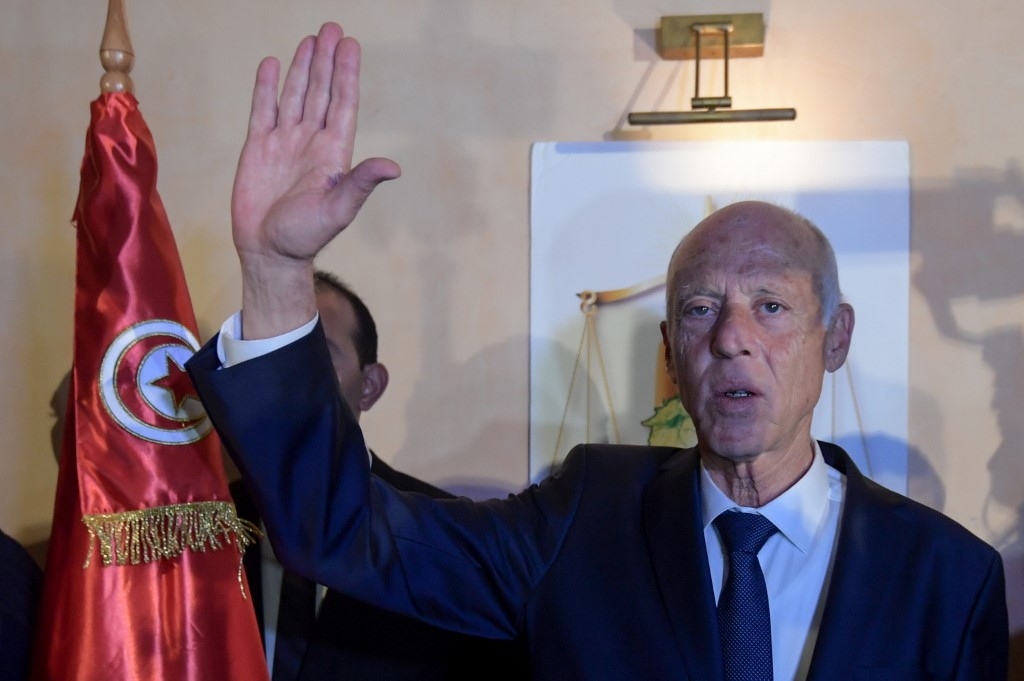
The Honourable Kais Saied
President of the Republic of Tunisia
Palace of the Republic, Carthage, Tunisia
Honourable Mr President:
We are long-time supporters of the Palestinian national struggle, active in the international boycott, divestment and sanctions (BDS) movement for Palestinian rights, born from the call of a coalition of Palestinian civil society in July 2005.
New MEE newsletter: Jerusalem Dispatch
Sign up to get the latest insights and analysis on Israel-Palestine, alongside Turkey Unpacked and other MEE newsletters
We would like to first congratulate you on your election as president of the Republic of Tunisia. Your brilliant victory not only rewards and affirms your commitments, but also expresses the will of the Tunisian people to take charge of their own national destiny.
We particularly welcome your commitment to the Palestinian cause. Your inaugural speech and your statements during the election campaign, in favour of the inalienable rights of the Palestinian people and against normalisation with Israel, have been very favourably received by the overwhelming majority of the Tunisian people and the Arab public in general. Palestinians have been particularly gratified by this show of solidarity.
Rooted in decades of Palestinian popular resistance against settler-colonialism and apartheid, and modelled on the South African anti-apartheid movement, BDS aims to intensify economic, cultural and political pressure on Israel’s regime of oppression until it recognises and implements the inalienable rights of the Palestinian people and fully complies with the norms and principles of international law.
BDS is anchored in the Universal Declaration of Human Rights and, as such, categorically rejects all forms of discrimination and racism, including Islamophobia and antisemitism.
We particularly welcome your commitment to the Palestinian cause
The impressive success of BDS, particularly in the United States and Europe, led Israeli President Reuven Rivlin to declare it a “strategic threat of the first order” to Israel's system of injustice. A show of Tunisian support for BDS and other nonviolent solidarity initiatives would send a powerful signal to the Arab world, as well as exert a much-needed expression of moral and political leadership that would inspire the Palestinian people in their decades-long struggle for their inalienable rights under international law.
This emboldens us to write to you for the purpose of submitting some suggestions - especially enacting into Tunisian law the historic commitment of the Tunisian people in favour of the inalienable rights of the Palestinian people, recalling the language of the preamble of the Tunisian constitution.
We would also like to draw your attention to the importance of transcribing into law the obligations arising for Tunisia as a member of the international community from extremely serious violations of international law committed by another state.
These obligations include, on one hand, avoiding all forms of aid or assistance to the policies of the state of Israel that result in war crimes, crimes against humanity and denial of the right to self-determination of the Palestinian people; and on the other hand, taking measures, including sanctions, in accordance with the UN charter, to end these grave Israeli violations of international law.
A show of Tunisian support for BDS and other nonviolent solidarity initiatives would send a powerful signal to the Arab world
These obligations were clearly set forth in the advisory opinion of the International Court of Justice (ICJ) in July 2004, which enjoyed the support of 14 of 15 judges - all but the US judge. This authoritative legal assessment was issued by the ICJ at the request of the UN general assembly, with specific reference to “the legal consequences of the construction of a wall in the occupied Palestinian territory”.
Michael Lynk, the UN special rapporteur on human rights in the Palestinian territories occupied since 1967, declared in the course of the presentation of his recent annual report that “the international community has a responsibility and legal obligation to compel Israel to end its 52-year-long ‘occu-annexation’ of Palestinian territory and remove barriers preventing Palestinian self-determination”. This statement resonates particularly well with recurrent calls by Tunisian civil society for a law that prohibits or criminalises all forms of normalisation with Israel.
It has long been evident that the accession of Tunisia to the 1950 League of Arab States’ boycott of Israel is no longer effective nor efficient.
However, it seems to us quite possible to correct the current situation, in which the interests of Israel and international companies benefiting from Israel’s illegal occupation, colonisation and apartheid system are upheld in Tunisia.
In January 2018, the UN high commissioner for human rights released a report identifying, but not naming, 206 companies doing business that support the illegal Israeli settlements built on stolen and confiscated Palestinian land in the occupied West Bank, including East Jerusalem. It is unfortunate that intense pressures exerted behind closed doors by Israel and the Trump administration have prevented the UN to date from releasing the actual names of the companies it has deemed complicit in Israel’s grave violations of international law.
It would be morally highly desirable and legally required to include in Tunisian law provisions mandating the exclusion from public and private tenders companies and financial institutions that carry out or profit from grave violations of international humanitarian and human rights law, including war crimes or crimes against humanity.
It also seems to us legally possible to prohibit, on the same grounds, entry into Tunisian territory any person directly or indirectly involved in war crimes and crimes against humanity. Beyond the obvious support for the Palestinian cause, such a law would serve many other just causes in the world, including potentially lending support to the persecuted Muslim community in China, or opposing business policies and practices that result in environmental destruction or contribute by unlawful acts to global warming.
In order that the inalienable rights of the Palestinian people “remain forever in the consciousness of free Tunisian citizens” and all freedom-loving citizens in the world, we urge you, Mr President, to initiate national legislation banning war crimes, crimes against humanity and denial of the right of peoples to self-determination - and censuring those who benefit from them. We are at your service to provide any assistance that you would consider useful in carrying out such a programme of action responsive to the ongoing Palestinian ordeal of unjust suffering.
Please accept, Mr President, this message as an expression of our highest respect for your office and your person.
Ahmed Abbes, mathematician, research director in Paris, coordinator of the Tunisian Campaign for the Academic and Cultural Boycott of Israel (TACBI) and secretary of the French Association of Academics for Respect for International Law in Palestine (AURDIP).
Richard Falk, emeritus professor of international law, Princeton University, former United Nations special rapporteur on "The Situation of Human Rights in the Palestinian Territories Occupied since 1967" (2008-2014) and senior vice-president of the board of directors of the Nuclear Age Peace Foundation.
The views expressed in this article belong to the authors and do not necessarily reflect the editorial policy of Middle East Eye.
Middle East Eye delivers independent and unrivalled coverage and analysis of the Middle East, North Africa and beyond. To learn more about republishing this content and the associated fees, please fill out this form. More about MEE can be found here.


